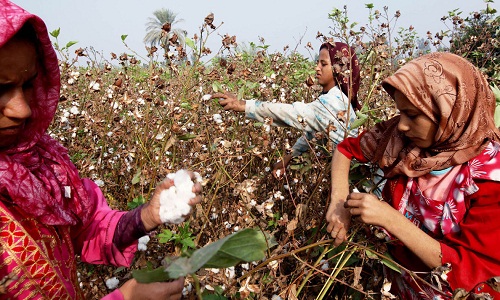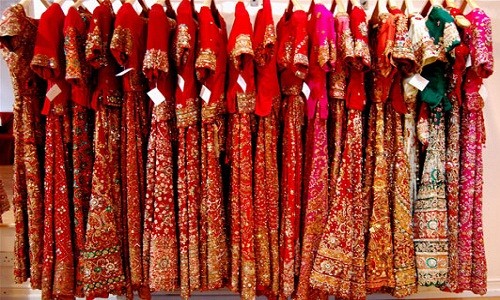FW
Following the demonetization, mills want the working capital limit to be enhanced by 50 per cent. Stocks have started piling up across the value chain of the industry and textile units say they are not in a position to collect any receivables. The result is that the cash flow of the textile industry has been seriously affected.
The industry assumes it would take at least six months to reach normalcy but in the meantime cotton prices have increased by around Rs 2,000 per candy as arrivals in the market came to a grinding halt during the first ten days after demonetisation.
The spinning sector was already reeling under a recession due to a sharp fall in yarn exports and now the withdrawal of around 86 per cent of the currency in circulation has led to a severe shortage of funds for regular operations such as purchasing the raw material, that is, cotton, and the sale of finished goods.
Textile retail showrooms and shops across the nation have been hit by the cash-crunch and low sales as customers have been saddled with Rs 2000 notes which they don’t know what to do with.
A two month moratorium has been granted for loans up to a crore, but the textile industry says it needs at least a year’s moratorium for repayment of the dues and interest.
The Annual Conference (2016) of the International Textile Manufacturers Federation (ITMF) was held in Jaipur recently. The Committee of Management of the Federation unanimously elected Kenya-based Jaswinder Bedi as the new President of the Federation. He would hold office for the next two years. Furthermore, the committee elected Kihak Sung (Korea Rep.) and Ruizhe SUN (China P R) as vice presidents and reconfirmed Peter Gnagi (Switzerland) as ITMF treasurer.
The committee also elected members of the non-executive board. The names are: Raffael Cervone (Brazil), John Cheh (Hong Kong, China), Muharrem Kayhan (Turkey), Andrew Macdonald (Brazil), Heinz Michel (Switzerland), B K Patodia (India), K V Srinivasan (India), Bassem Sultan (Egypt) and Loek de Vries (Netherlands). In recognition of his outstanding contribution to the Federation during his six years service as ITMF Vice President (2010-14) and ITMF President (2014-16) Tiankai WANG (China PR) was appointed Honorary Life Member of the Federation.
The European Union may sign the textile protocol with Uzbekistan after all. Five years ago it had decided not to sign because Uzbekistan was known to use child labor and forced adult labor in its textile production units.
But in 2013, Uzbekistan started permitting the ILO to monitor the annual harvest. Owing to boycott from major clothing manufacturers, Uzbekistan drastically cut down on child labor. So the ILO came to the conclusion that the use of children in cotton harvest had become rare and sporadic. In effect, it said, the practice of forced labor and child labor was effectively in the process of being eradicated.
However, human rights groups insist that forced labor has taken the place of child labor and continues to be used on a massive, nationwide scale in Uzbekistan. They say, independent monitors are harassed and not being allowed to examine the situation as closely as they would like to. They point to the fact that no concrete reforms have been implemented and no substantial results are visible. So the groups say the protocol should be signed only after thought and care. The issue will be put to vote in December.
"Ever since Target found that a supplier was selling its bed sheets that falsely had 100 per cent Egyptian cotton, an industry group in Egypt has stiffened its standards and doubled down on DNA-based certification. The retailer dropped a contract with Welspun India after it became clear that the sheets Target was getting were not 100 per cent Egyptian cotton as advertised. And the retailer was just the first: Walmart dropped the sheets soon after which Bed Bath & Beyond followed in the same trajectory. Other firms also have been quick to audit the textile giant."

Ever since Target found that a supplier was selling its bed sheets that falsely had 100 per cent Egyptian cotton, an industry group in Egypt has stiffened its standards and doubled down on DNA-based certification. The retailer dropped a contract with Welspun India after it became clear that the sheets Target was getting were not 100 per cent Egyptian cotton as advertised. And the retailer was just the first: Walmart dropped the sheets soon after which Bed Bath & Beyond followed in the same trajectory. Other firms also have been quick to audit the textile giant.

This move has shaken up the bedding industry and threatened the future of Welspun. It also put attention on Egyptian cotton in general for which demand has grown even as cotton production from the country has shrunk significantly. The Cotton Egypt Association (CEA), the group that certifies fabrics as 100 per cent Egyptian, has long tested producers’ fibers. The process of certification, however, has faced challenges, because of size limitations.
Announced earlier this year, CEA’s latest strategy is to conduct DNA-based testing to test more effectively. The results are telling in ways that Currently, Welspun is heavily depending on CEA as it wants to repair its brand image at the earliest. Among other steps, Welspun is using CEA’s DNA-based certification process to confirm the integrity of its sheets as well as moving its production of such cotton in-house from procuring cotton to the finished product, The company has maintained its Gold Seal certification from CEA.
With a new focus on healthcare textiles, innovative yarn and its applications, the 18th YiwuTex will be held at Yiwu International Expo Centre, Jinhua, China from June 13-15, 2017. The show will feature three thematic zones: Functional Knitting Machinery Zone, Smart Apparel Machinery Zone and Digital Printing Machinery Zone. Visitors to the event can join such a wonderful gathering with top-notch industry players and textile machineries.
China’s textile and garment exports in 2015 saw a 4.9 per cent dip compared to the same period last year, while profits in sportswear increased over 20 per cent mainly due to sales of functional wear. The figure indicates that high-tech and value-add apparel products have become the market heat and the key for traditional textile industry to get out of its dilemma.
Embracing new market development, YiwuTex 2017 will focus on healthy and functional textile products. The introduction of latest technology in the show could revitalise the production chain of the textile industry and strengthen the enterprises by adding values to their products.
Based on rapid growth of industry, YiwuTex 2017 will launch an apparel ERP system and e-commerce platform zone that will showcase the latest automatic machinery and intelligent management technology; promote online to offline production data management; encourage the traditional production line innovation and provide optimized solutions for textile and garment enterprises. One of the show highlights of last year’s show was its Digital Printing Machinery Zone which drew much attention from the buyers.
"With China increasingly looking to serve its domestic market and facing high labour costs, India is at certain advantage in gaining global lead in textile exports. With a huge demographic dividend and lower wage rates compared to exporters in Southeast Asia and China, India has many positives. The Government’s ‘Make in India’ programme also aims to propel India’s growth as the leading exporter of the world."

With China increasingly looking to serve its domestic market and facing high labour costs, India is at certain advantage in gaining global lead in textile exports. With a huge demographic dividend and lower wage rates compared to exporters in Southeast Asia and China, India has many positives. The Government’s ‘Make in India’ programme also aims to propel India’s growth as the leading exporter of the world.

A recently released World Bank report, ‘South Asia’s Turn: Policies to Boost Competitiveness has and Create the New Export Power House’, highlighted the potential of South Asia to become the next factory of the world. The report cites increasing labour costs in China as the key factor which could lead to this transition. Increasing labour costs have been the major determinant of location of exporting industries historically. It was Japan which first challenged manufacturing in the West through low labour costs, only to lose to Asian tigers later, which subsequently lost out to China. However, it needs to be kept in mind that just low labour costs do not guarantee export success. Despite having higher wages, China has a much bigger share in the global apparel industry than south Asian countries.
Among other recommendations, the report also underlines the importance of integration into Global Value Chains (GVCs) for expanding manufacturing in south Asia. While the emphasis on GVCs is not new, the renewed thrust seems to be in the backdrop of trade facilitation agreement (TFA), which was arrived upon in the World Trade Organisation’s ministerial conference in Bali in 2013. TFA is aimed at harmonising trade regulations such as custom clearance procedures, by drastically improving trade infrastructure in third world countries. The report identifies timely access to key imported inputs as an important factor for sectors such as apparel and electronics, something which can greatly improve due to TFA.
Boosting competitiveness
The role of GVCs in boosting a country’s export competitiveness is a widely debated topic in economics. Organisations such as the WTO, OECD (Organisation for Economic Co-operation and Development) and the World Bank have been arguing that GVCs can help a country boost its manufacturing exports, provided right kinds of reforms accompany them. Such policy prescriptions have focussed more on labour market reforms and improvement in ease of business rankings, and remained critical of attempts to force domestic content requirements on players involved in GVCs. On the other hand, many developing countries have lamented the fact that thanks to GVCs, they have become stuck at low value addition activities without much income generation.
Impact of GVC integration
After the opening up of the economy in 1991, Indian manufacturing has become more integrated with the rest of the world. This has been accompanied by an increasing share of manufacturing exports in India’s total export basket as well. However, it is also a fact that manufacturing’s share in India’s GDP has been more or less stagnant in the Indian economy. India has been witnessing a decline in its value added manufacturing in the post-reform period, resulting from a large increase in imports of processed industrial supplies, which suggests increasing outsourcing of content requirements.
Although increasing integration to the global economy has benefitted a section of Indian manufacturing, India has ended up importing more from the rest of the world rather than exporting to it. India is not the only economy, which is facing such problems. In 2014, Indonesia banned imports of raw materials, to increase domestic sourcing of its manufacturing activity. Such policies carry the twin risk of alienating investors as well as promoting inefficiencies within the economy in the name of domestic sourcing.
Working towards the goal
There is a need to improve investment climate in the South Asian regions vis-à-vis other manufacturing centres in the world. Although India fares much better than its South Asian peers, it is much behind countries such as China. A tepid global economy, trade growth environment and rising protectionist politics in the advanced capitalist world is likely to make export led growth more difficult in the days to come. Unless India undertakes holistic reforms, which equip its manufacturing sector to fully exploit the advantages of integration to the global economy, it is unlikely to realise the dreams of the becoming the next global factory.
According to an estimate, the global spandex market size is likely to exceed 1,550 kilo tons by 2023 from over 760 kilo tons in 2015 growing at a CAGR of more than 8 per cent from 2016 to 2023. Spandex is commonly known as elastane. Among the manufacturers, dry spinning technology was majorly preferred in the past few years. Other processes include wet spinning, melt extrusion and reaction spinning.
Sportswear application is likely to see highest gains over the forecast period. Technology advancement with moisture management properties coupled with performance efficiency is likely to benefit elastane market growth. Up to 3 per cent of spandex fiber in fabric is enough for fabric improvement and shape retention whereas high performance garments such as swimwear is may contain 30 per cent. Global sportswear market size was estimated at over $260 billion in 2013 and is likely to grow at a CAGR of over 7 per cent up to 2023. Sportswear accounted for over 15 per cent of the clothing industry.
Growing application scope in apparel and textile industry is likely to drive the spandex market over the forecast period. They are used in textile manufacturing applications such as leggings, gloves, cycling jerseys and competitive swimwear. Owing to ease of tight supply and low demand from downstream applications, the price of the spandex was said to be weak in mid 2014. The market is expected to grow with recovery in US economy post recession.
Founded in 1973, Patagonia is an American outdoor apparel company. It is recognized internationally for its commitment to authentic product quality and environmental activism. It contributes to grassroots organizations working in local communities to protect air, water and soil for future generations. It funds grassroots environmental organizations by giving away one per cent of its sales.
Patagonia always looks for ways to further reduce its manufacturing footprint, including its reliance on fossil fuels. By roping in active in communities, it effects local change to protect the food people eat, the water they drink, the air they breathe. The company defends policies and regulations that reduce carbon emissions, build a modern energy economy based on investment in renewables and, most crucially, ensure the United States remains fully committed to the goals set forth in the Paris Climate Agreement.
For decades, Patagonia has demonstrated that caring for the planet is not in conflict with running a successful business. To date that amount totals 74 million dollars. It will celebrate Black Friday this year on November 25 through which customers can show their love for the planet.
Patagonia acts under the belief that if no action is taken severe changes in climate, water and air pollution, extinction of species, and erosion of topsoil are certain outcomes.
US President-elect Donald Trump's decision to leave the 12-nation Trans-Pacific Partnership (TPP) has given a strong blow to a massive trade deal that was an important plank of President Barack Obama's re-engagement with Asian nations. Trump has said that instead of one agreement that would account for 40 per cent of world trade, he would plan to negotiate one-on-one trade deals that will be more favourable for American workers.
Analysts say coming out of the deal would open new trade opportunities for China, which was any way not a part of the TPP. Negotiators toiled for seven years on the TPP which supporters say would encourage additional trade among the 12 nations.
It would have also given rise to worker incomes, place important protections on intellectual property, protect labor rights and incorporate environmental safeguards. Critics have said the deal, which was negotiated in secret, of being overly favourable to global corporations, and enshrine tough intellectual property restrictions. The Council on Foreign Relations in a report this month, backed the TPP, saying the pact would benefit manufacturers with a more level playing field in Asia. This would boost US exports, especially agricultural goods.
While some American jobs could be lost to overseas workers, TPP supporters argued that the deal was better overall for Americans, because it would result in lower prices on imported consumer goods, they claimed. The report, citing research by the Petersen Institute for International Economics, said that the TPP offered potential annual gains of $78 billion for the US economy.
The UK and Germany are leading in adopting RFID (radio-frequency identity) technology, accounting for around 70 per cent of the European fashion business. The total value of the RFID market is worth over $10 billion and is expected to touch $18.6 billion over the next decade. This is largely attributed to falling cost of tags not to mention the advantages offered by automated tracking and real-time visibility of every article in stock.
Connected technologies enable fashion retailers to automate processes and reduce administrative duties, freeing up staff to focus on customer service. Combined with near 100 per cent inventory accuracy, this leads to an enhanced shopping experience and higher sales conversion rates.
More and more retailers are turning to analytics, RFID and other in-store technologies. Retailers increasingly want cloud-based retail solutions with the promise of faster, pay-as-you-go software implementations.
Retail software specialist Detego has now digitally connected over a billion items of clothing. Detego is currently rolling out its software across 900 stores for a global sports brand, at a rate of about twenty stores a week, to improve the in-store experience for consumers and to support the brand´s omni-channel strategies. The retailer is gradually adding RFID tags to every article of clothing and footwear so that it can manage all 80 million items in real time.












